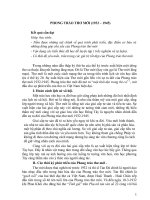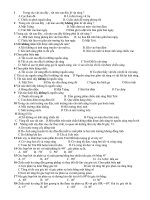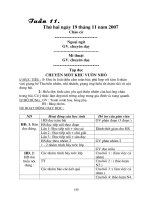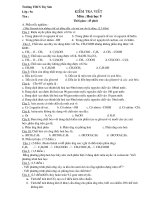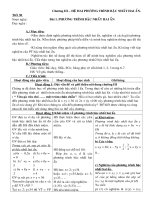GERUND, INFINITIVE AND PARTICIPLE (CUC HAY)
Bạn đang xem bản rút gọn của tài liệu. Xem và tải ngay bản đầy đủ của tài liệu tại đây (148.69 KB, 14 trang )
Gerund, infinitive and participles
The gerund
PEG 257
Put the verbs in brackets into the gerund.
1 He gave up (gamble).
2 Try to avoid (make) him angry.
3 Stop (argue) and start (work).
4 The children prefer (watch) TV to (read).
5 I am against (make) any complaints.
6 It's no use (cry) over spilt milk. {proverb)
7 I suggest (hold) another meeting next week.
8 He finished (speak) and sat down.
9 He was fined for (drive) without lights.
10 It is difficult to get used to (eat) with chopsticks.
11 if you can't turn the key try (put) some oil in the lock.
12 He lost no time in (get) down to work.
13 You can't make an omelette without (break) eggs. (proverb)
14 We are looking forward to (read) your new book.
15 They escaped by (slide) down ropes made of blankets.
16 They don't allow (smoke) in here.
17 He is thinking of (leave) his job and (go) to America.
18 After (read) this article you will give up (smoke).
19 If you put your money into that business you risk (lose) every penny.
20 Imagine (live) with someone who never stops (talk).
21 Is there anything here worth (buy)?
22 He was accused of (leak) classified information to the press.
23 You'd better consult your lawyer before (decide) to buy the property.
24 I don't enjoy (go) to the dentist.
25 Would you mind (put) your pet snake somewhere else?
26 The hostages were rescued without a shot (be) fired.
27 By (work) day and night he succeeded in (finish) the job in time.
28 He has a scheme for (make) grass grow in winter.
29 I don't feel like (work); what about (go) to a disco instead?
30 Would you mind (write) your name and address on the back of the cheque?
31 If a thing is worth (do) at all it is worth (do) well. (proverb)
32 I hate (borrow) money.
33 He was furious at (be) mistaken for an escaped convict.
34 After (talk) for ten minutes I succeeded in (convince) him that there was no danger.
35 I remember (read) a review of that book and (think) I'd like to get.
36 As a result of (listen) at keyholes he learnt many facts which he no hesitation in (use)
to his own advantage.
Gerund and infinitive
PEG 266-71
Put the verbs in brackets into the correct form (gerund or infinitive)
1 I am looking forward to (see) you.
2 He dreads (have) to retire.
3 I arranged (meet) them here.
4 He urged us (work) faster.
5 I wish (see) the manager.
6 It's no use (wait).
7 He warned her (not touch) the wire.
8 Don't forget (lock) the door before (go) to bed.
9 My mother told me (not speak) to anyone about it.
10 I can't understand her (behave) like that.
11 He tried (explain) but she refused (listen).
12 At dinner she annoyed me by (smoke) between the courses.
13 You are expected (know) the safety regulations of the college.
14 He decided (disguise) himself by (dress) as a woman.
15 lam prepared (wait) here all night if necessary.
16 Would you mind (show) me how (work) the lift?
17 After (walk) for three hours we stopped to let the others (catch with us.
18 I am beginning (understand) what you mean.
19 He was fined for (exceed) the speed limit.
20 The boys like (play) games but hate (do) lessons.
21 I regret (inform) you that your application has been refused.
22 I couldn't help (overhear) what you said.
23 Mrs Jones: I don't allow (smoke) in my drawing-room.
Mrs Smith: I don't allow my family (smoke) at all.
24 He surprised us all by (go) away without (say) 'Good-bye'.
25 Please go on (write); I don't mind (wait).
26 He wore dark glasses (avoid) (be) recognized.
27 Before (give) evidence you must swear (speak) the truth.
28 I tried (persuade) him (agree) with your proposal.
29 Your windows need (clean); would you like me (do) them for you?
30 Would you mind (shut) the window? I hate (sit) in a draught.
31 I can't help (sneeze); I caught a cold yesterday from (sit) in a draught.
32 Do stop (talk): I am trying (finish) a letter.
33 His doctor advised him (give up) (jog).
34 My watch keeps (stop). ~
That's because you keep (forget) (wind) it.
35 Without (realize) it. he hindered us instead of (help) us.
36 People used (make) fire by (rub) two sticks together.
Gerund and infinitive
PEG 266-71
Put the verbs in brackets into the correct form (gerund or infinitive).
1 He hates (answer) the phone, and very often just lets it (ring).
2 If you go on (let) your dog (chase) cars he'll end by (be) run over.
3 I prefer (drive) to (be driven).
4 I advise you (start) (look) for a flat at once.
5 Would you mind (lend) me Ј5? I forgot (cash) a cheque.
6 (Lie) on this beach is much more pleasant than (sit) in the office.
7 She likes her children (go) to the dentist every six months.
8 By (neglect) (take) ordinary precautions he endangered the life of his crew.
9 An instructor is coming (show) us how (use) the aqualung.
10 I have no intention of (go) to that film; I couldn't bear (see) my favourite actress in such
a dreadful part.
11 I suggest (telephone) the hospitals before (ask) the police (look) for him.
12 After (hear) the conditions I decided (not enter) for the competition.
13 Some people seem (have) a passion for (write) to the newspapers.
14 He expects me (answer) by return but I have no intention of (reply) at all.
15 I tried (explain) to him but he refused (listen) and went on (grumble).
16 By (offer) enormous wages he is persuading men (leave) their present jobs and (work)
for him.
17 He postponed (make) a decision till it was too late (do) anything.
18 Imagine (have) (get up) at five a.m. every day!
19 Try (forget) it: it isn't worth (worry) about.
20 There is no point in (remain) in a dangerous place if you can't do anything (help) the
people who have (stay) there.
21 The horse won't be well enough (run) in tomorrow's race. He doesn't seem
(have recovered) from his long journey.
22 At first I enjoyed (listen) to him but after a while I got tired of (hear) the same story
again and again.
23 It is usually easier (learn) a subject by (read) books than by (listen) to lectures.
24 It wouldn't be safe (start) down now; we'll have (wait) till the mist clears.
25 After (discuss) the matter for an hour the committee adjourned without (have reached)
any decision.
26 It's not much use (have) a bicycle if you don't know how (ride) it.
27 He didn't dare (leave) the house because he was afraid of (meet) someone who might
(recognize) him.
28 I distinctly remember (pay) him. I gave him Ј2.
29 Did you remember (give) him the key of the safe? ~
No, I didn't. I'll go and do it now.
30 Please forgive me for (interrupt) you but would you mind (repeat) that last sentence?
31 I know my hair wants (cut) but I never have time (go) to the hairdresser's.
32 He made a lot of money by (buy) tickets in advance and (sell) them for twice the price
on the day of the match.
33 She rushed out of the room without (give) me a chance (explain).
34 He keeps (ask) me the time and I keep (tell) him (buy) himself a watch.
35 He has a theory that it is possible (tell) the time in daylight by (look) into a cat's eyes.
36 I'd hate (be) beside a volcano when it started (erupt).
Gerund and infinitive
PEG 266-71
After like it is sometimes possible to use either gerund or infinitive, but there tends to be a
slight difference in implication.
like + gerund usually means 'enjoy'; it also usually implies that the action is/was
performed: I like skating = I enjoy skating (and do skate).
like + infinitive has more the meaning of 'approve of, like the idea or habit'. In the
affirmative it gives no indication as to whether the action is performed or not, and in the
negative implies that it is not performed.
I didn't like saying it usually means 1 said it, unwillingly', but
I didn't like to say it usually means 1 didn't say it' (because it didn't seem right or
sensible). The distinction, however, is not rigid. The above notes are, therefore, only
guides which may safely be followed.
Put the verbs in brackets into gerund or infinitive.
1 I used (ride) a lot but I haven't had a chance (do) any since (come) here. ~
I ride sometimes. Would you like (come) with me next time?
2 Most people prefer (spend) money to (earn) it.
3 I resented (be) unjustly accused and asked him (apologize).
4 It isn't good for children (eat) too many sweets.
5 I didn't feel like (work) so I suggested (spend) the day in the garden.
6 Why do you keep (look) back? Are you afraid of (be) followed?
7 Do you remember (post) the letter? ~
Yes, I do; I posted it in the letter-box near my gate.
8 Did you remember (lock) the door? ~
No, I didn't. I'd better (go) back and (do) it now.
9 You still have a lot (learn) if you'll forgive my (say) so.
10 It's no use (try) (interrupt) him. You'll have (wait) till he stops (talk).
11 I'm for (do) nothing till the police arrive. They don't like you (move) anything when a
crime has been committed.
12 He didn't like (leave) the children alone in the house but he had no alternative as he had
(go) out to work.
13 Why didn't you drink it?-
I didn't like (drink) it as I didn't know what it was.
14 I'm very sorry for (be) late. It was good of you (wait) for me.
15 I keep (try) (make) mayonnaise but I never succeed. ~
Try (add) the yolk of a hard-boiled egg.
16 Do you feel like (go) to a film or would you rather (stay) at home?
17 She told me (look) through her correspondence and (take) out any letters that you had
written her. I didn't like (look) through someone else's letters but I had (do) as she said.
18 He took to (get up) early and (walk) noisily about the house.
19 I liked (listen) to folk music much better than (listen) to pop.
20 The car began (make) an extraordinary noise so I stopped (see) what it was.
21 You'll never regret (do) a kind action.
22 He decided (put) broken glass on top of his wall (prevent) boys (climb) over it.
23 He annoyed me very much by (take) the piece of cake that I was keeping (eat) after my
supper.
24 He kept (ring) up and (ask) for an explanation and she didn't know what (do) about him.
25 We got tired of (wait) for the weather (clear) and finally decided (set) out in the rain.
26 He made me (repeat) his instructions (make) sure that I understood what I was (do) after
he had gone.
27 I suggest (leave) the car here and (send) a breakdown van (tow) it to the garage.
28 She apologized for (borrow) my sewing-machine without (ask) permission and
promised never (do) it again.
29 I didn't mean (offend) anyone but somehow I succeeded in (annoy) them all.
30 She claimed (be able) (tell) the future by (gaze) into her crystal ball.
31 He never thinks of (get) out of your way; he expects you (walk) round him.
32 You don't need (ask) his permission every time you want (leave) the room.
33 The police accused him of (set) fire to the building but he denied (have been) in the area
on the night of the fire.
34 I left my door open. Why didn't you walk in? ~
I didn't like (go) in when you weren't there.
35 It's much better (go) to a hairdresser than (try) (save) time by (cut) your own hair.
36 I'd rather (earn) my living by (scrub) floors than (make) money by (blackmail) people.
Infinitive, gerund, present participle
PEG 266-75, 295 C, 295 D
This exercise includes examples of both ing forms, the gerund and the present participle.
Either present participle or infinitive without to can be used after verbs of the senses.
Put the verbs in brackets into a correct form. When more than one
form is possible it will be noted in the key.
1 When the painter felt the ladder (begin) (slip) he grabbed the glitter (save) himself from
(fall).
2 The snow kept (fall) and the workmen grew tired of (try) (keep) the roads clear.
3 He offered (lend) me the money. I didn't like (take) it but I had no alternative.
4 What was in the letter? ~
I don't know. I didn't like (open) it as it wasn't addressed to me.
5 Do you remember (read) about it? ~
No, at that time I was too young (read) newspapers.
6 Did you remember (book) seats for the theatre tomorrow? ~
Yes, I have the tickets here. Would you like (keep) them? I am inclined (lose) theatre
tickets.
7 Try (avoid) (be) late. He hates (be) kept (wait).
8 I didn't know how (get) to your house so I stopped (ask) the way.
9 I wish my refrigerator would stop (make) that horrible noise. You can't hear anyone
(speak).
10 This book tells you how (win) at games without actually (cheat).
11 The gunman began (fire). He felt a bullet (graze) his cheek.
12 He heard the clock (strike) six and knew that it was time for him (get) up.
13 I can hear the bell (ring) but nobody seems (be coming) (open) the door.

